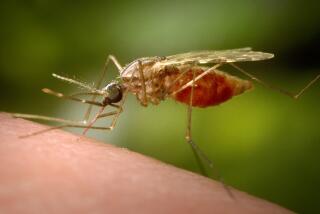Vaccine seems to clear monkeys of HIV-like infection; humans next?
- Share via
Scientists have developed a vaccine that protected monkeys against simian immunodeficiency virus, or SIV, offering fresh hope that a similar vaccine can save humans from HIV.
When the monkeys were intentionally infected with SIV, the new vaccine cleared the infection and kept the animals virus-free for up to three years, according to a report this week in the journal Nature.
Although there are medications to keep HIV in check for long periods of time, they can’t eliminate the virus altogether. Efforts to develop an HIV vaccine have so far failed.
Vaccines typically contain a harmless amount of the virus it’s designed to protect against. By introducing it to the body in a non-threatening way, the immune system gets a chance to develop antibodies that will be ready to attack the virus if it ever reappears.
Most vaccines are designed to trigger a large-scale immune system attack, which then weakens over time. Producing the immune cells required for such an attack can take weeks.
These conventional vaccines are no match for SIV and HIV, which are fast-acting, persistent viruses. So the new vaccine — a modified version of a herpes virus known as cytomegalovirus, or CMV — contains just enough SIV to elicit an ongoing immune response that keeps the body “armed and ready” to search out and destroy the virus, said Louis Picker, an immunologist at Oregon Health and Science University who helped design the vaccine.
Picker and his colleagues tested the vaccine on 16 rhesus macaques. They vaccinated the monkeys, waited about two months, then infected them with SIV.
Seven of the monkeys got sick and died. But the other nine didn’t develop any outward symptoms of SIV. They did show signs of infection – the immune system cells that had been hijacked by the virus were still producing small amounts of it, for example – for weeks to months after exposure. But these signs decreased over time.
After one year, eight of the nine animals had no evidence of infection. They remained SIV-free for up to three years after exposure. The virus reappeared in one of the monkeys, but at low levels.
As a final test, the researchers injected blood and lymph cells from the eight apparently virus-free monkeys into other rhesus macaques that had never been exposed to SIV. None of the recipients became infected. That suggests the vaccine had completely cleared the virus from the eight monkeys originally infected, since it takes only one virus to establish an infection.
“It’s remarkable because HIV is a virus that everyone thought of as permanent,” Picker said. “This is really the first demonstration that a pathogenic virus can be eliminated by the patient’s own immune system.”
But the researchers still can’t say for sure whether the vaccine completely eradicated SIV from the monkeys, since they didn’t search everywhere for the virus.
“We claim that this is clearly a functional cure,” although small amounts of SIV may still be present, Picker said. Still, the findings are “consistent with eradication,” he added.
The researchers are now investigating why half of the vaccinated monkeys didn’t benefit from the treatment. The answer may lead to a better vaccine design.
In a future trial, the team plans to test whether the vaccine has the ability to not only prevent SIV, but to treat monkeys that already have the disease. This time, they’ll expose the animals to SIV before vaccinating them to see whether they also show clearance of the disease.
But “the really big challenge” will be to see whether the new findings translate to humans, Picker said. He and his colleagues hope to begin early-stage clinical trials as soon as 2015.
The team should take extra precautions when developing a vaccine based on CMV for humans, since the herpes virus is still live, said Dr. Steven Deeks, a clinical researcher at UC San Francisco who wasn’t involved in the study. “We may end up exchanging one virus for another,” he said.
But if all goes well, the vaccine “might have a major impact on the global epidemic,” Deeks said. Current antiretroviral therapies vastly diminish HIV but don’t eradicate it, he said. They can also be expensive, and patients need to take them every day for the rest of their lives.
“In theory, we can give them a CMV vaccine engineered to attack HIV, and they’re cured,” Deeks said.
Twitter: @mmpandika





